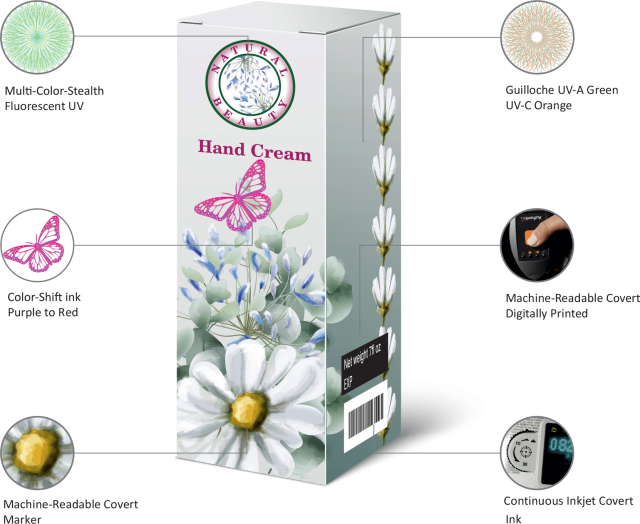Author: Andree Bourgeois
Ten Insights into Brand Protection
|Customer Spotlight: Fuel Authentication
|Fighting the Illegal Market: An Interview with Tim Driscoll
|The article below is the result of an interview conducted by Mila Milosavljević, a writer for Serbian publication Pečat, of Tim Driscoll, Authentix Senior Vice President and General Manager, Currency and Tax Stamp. This content has been edited and translated to English for use on authentix.com. You can find the original copy on the publication’s website http://www.pecat.co.rs/2019/11/tim-driskol-borba-protiv-ilegalnog-trzista/
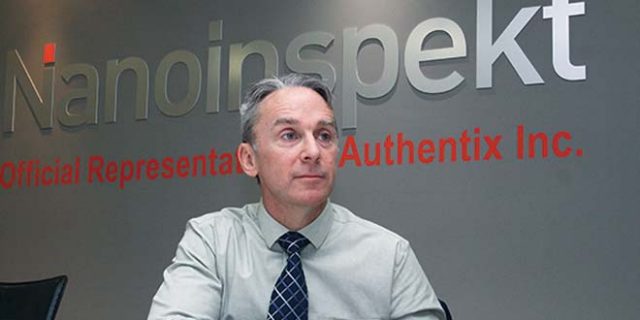
Tim Driscoll is the Senior Vice President and General Manager of Currency and Tax Stamp at Authentix, a US-based company committed to helping government officials and business leaders thrive in supply and distribution chain complexity with innovative authentication solutions. With offices in Europe, the Middle East and Africa in addition to the US, Authentix provides global support to central banks to protect their banknotes, helping tax authorities collect excise taxes and helping governments and national oil companies maintain fuel quality and fight fuel smugglers. Authentix also works with brand owners to protect the health of their customers and protect revenue that they’re losing due to diversion and counterfeiting.
Authentix partners with organizations in several countries to best serve their customers. Authentix’ partner in Serbia is Nanoinspekt, which is Authentix’ official representative and distributor in Serbia and the surrounding countries. As our interlocutor points out, these two companies are intensively working on expanding their business and cooperation in the future.
Can you tell us more about your background?
I have been in the product authentication industry for almost 25 years and have spent the last 14 years at Authentix. I have used my physics background and experience in the industry to serve as a trusted partner to government clients as we help them address their counterfeiting and tax recovery challenges.
Undoubtedly Authentix is pushing the boundaries in this business? How do they do that?
The solutions we apply are very complex and involve a wide variety of innovative technologies. Authentix is developing new security measures to enhance these programs. We are raising these programs to a higher level by implementing new and enhanced software systems to collect and analyze the data gathered from program operations. Part of our mission is to protect the integrity of the global marketplace through innovative authentication solutions. We are constantly improving the way we process operational data that we provide to clients. Those clients who successfully implement the program use data analytics as a basis for prioritizing and adopting appropriate measures to ensure product authenticity in the market.
How was Authentix founded?
The creation of Authentix started with two companies, one based in the US, and the other based in the United Kingdom. The foundation of the US company was based on technologies derived from Los Alamos National Laboratory, which later turned into fuel marking technology. The British company was based on a completely different technology derived from the University of York, which also found application in the fight against smuggling. In 2003, the two companies merged to form Authentix.
What would you define as the greatest achievement of Authentix so far?
In general, the programs we are most proud of are those that pay back taxes evaded by illegal acts to the state and its citizens. Also, one of the programs we are most proud of is the program in Serbia. This program illustrates what a strong partnership looks like when the right technology is implemented, when quality operational data is provided, and when authorities are willing to leverage that data to combat the illegal fuel market.
Tell us more about the programs in the field of excise stamps and protection of banknotes?
As far as the excise stamp program is concerned, we are very proud of the program we have introduced in Ghana. In this program, we have created a technology solution that allows the state to collect the full amount of excise duty on tobacco, alcohol and other beverages including beer, as well as water and sodas.
How have these programs been implemented before Authentix, and how are they done now, using the analogy of how fuel was once marked with solvent (yellow) and now molecular nanomarker?
All of these programs are essentially a game of cat and mouse. When we find a solution to one problem and apply it, those involved in the illegal fuel trade immediately try to circumvent security solutions. To address this problem, Authentix focuses on being flexible. We are flexible in the technology selected, how it’s implemented and how it is supported. The banknote security industry has historically been reduced to a very small number of companies. Authentix, as one of these companies, has created innovative products for central banks that will solve their problems. The current trend of this industry is that central banks are trying to reduce dependency on one company. They are less likely to procure all protection measures from one or a small number of suppliers and want to be free to choose different offers from different suppliers. This is not the easiest way to keep the security level at a high level, but Authentix solutions are tailored to how central banks operate. For example, our features are seamlessly added into the banknotes and our sensors are easily integrated into the existing equipment used by most central banks.
How do you evaluate cooperation with Nanoinspekt, your partner in Serbia?
The collaboration so far has been fantastic. We collaborate with many partners around the world, but one thing that is special about Nanoinspekt is that we do not perceive it as a collaboration, but feel as if we are part of the same company with the same purpose.
Fuel Authentication Case Study: Ghana
|Authentix uses its advanced and innovative fuel authentication solution to help the nation of Ghana combat adulteration of its petroleum products and recover lost revenue.
THE CHALLENGE
With a population of almost 28 million, Ghana is one of the fastest growing nations in Africa. It has moderate fuel taxes compared to its neighbors and limited fuel subsidies. The government of Ghana discovered that the adulteration of petroleum products offered for sale at retail outlets was degrading the quality of the available supply, while depriving the nation of significant tax revenue. In fact, baseline testing demonstrated that 32% of fuel stations had at least one tank showing dilution. Government officials estimated that the tax losses incurred because of this adulteration was more than USD 10 M annually. Ghana was in urgent need of a solution to combat adulteration of its petroleum products and recover fiscal tax revenue that was sorely needed for economic development.
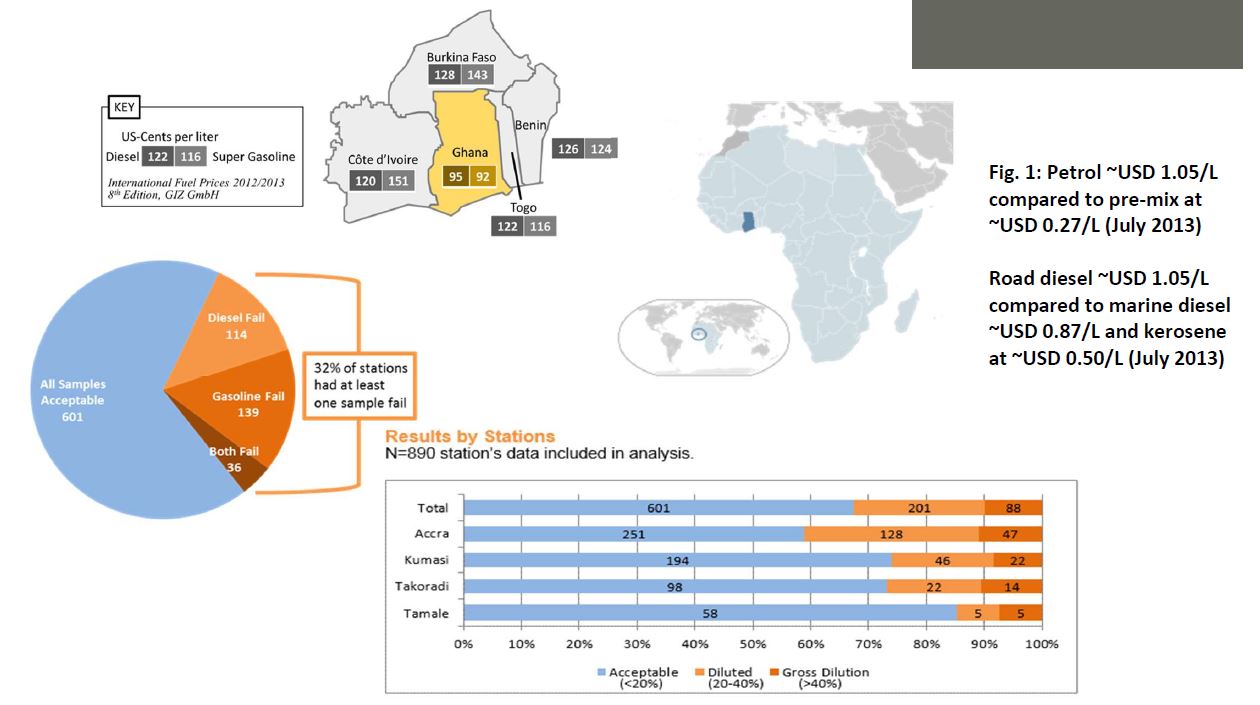
THE SOLUTION
Since 2013, Authentix has been providing the Ghana National Petroleum Authority (NPA) with a fuel authentication solution. The program’s objectives are reducing deterioration in the quality of petroleum products due to dilution and adulteration whilst ensuring the appropriate recovery of fiscal tax revenues from the sale of petroleum and diesel for passenger vehicles.
Full-taxed domestic fuels are marked with a field quantitative marker for screening and dilution detection, and a forensic marker for lab confirmation. Subsidized products are marked to detect adulteration in domestic fuel. The Authentix solution is comprised the following core components:
MARKERS & DEVICES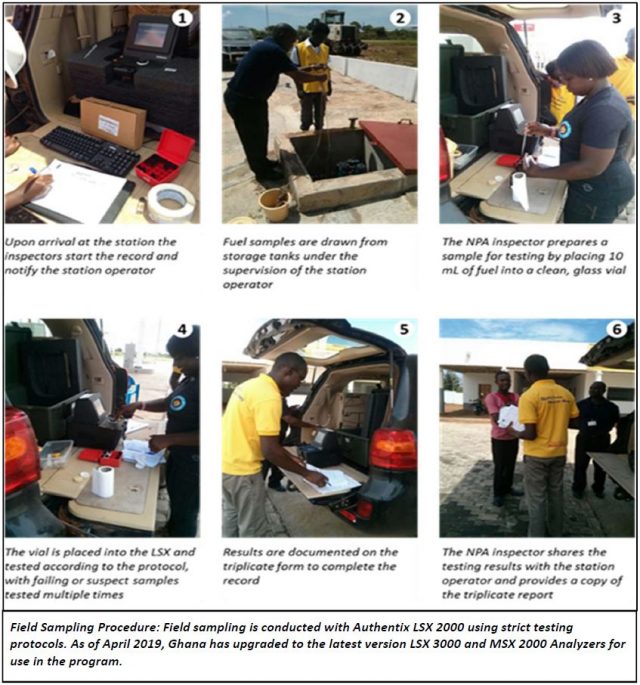
Authentix LSX field analyzer detects dilution of taxed road fuels at fuel stations. Authentix MSX analyzer provides quantitative, forensic results in a laboratory environment. MSX analyzers are also used to measure the concentration of the MSX fuel marker that is added to fuel at the depot with the LSX marker. MSX analyzers were placed in regional labs in the largest cities in five regions of Ghana.
SERVICES & SUPPORT
- Marking operations (marker storage & reconciliation, logistics, hand-marking trucks, warehouse management, etc.)
- Field testing/sampling implementation, training, auditing and maintenance
- Laboratory implementation and maintenance
- Program management and reporting
THE OUTCOME
With the adoption of the Authentix fuel authentication program in Ghana, there has been a marked improvement in the quality of the fuel supply of the country. Additional benefits include:
- A 78% reduction in adulteration of sampled products
- An increase of excise tax collection estimated to be almost USD 9 M annually
- Improved environmental and public health benefits: In most cases, the adulterant used to dilute either gasoline or diesel affects the quality of the product resulting in vehicle engine failures and harmful environmental emissions
- The program was originally planned to mark two billion liters. Today, over three billion liters of fuel is marked, with continued
reduction in contraband and the preservation of authentic, marked fuel on the market.
The program designed and implemented by Authentix has established an international reputation as a best-in-class fuel authentication program because of its continuous improvement over time, consistent increases in recovered volumes and taxes of excisable and subsidized fuels, and the reduction in the number of samples and retail outlets showing signs of dilution or adulteration.
Case Study: Serbia
|Authentix deploys a fuel authentication program to help Serbia recover millions in lost excise taxes
-
Government fuel excise revenues for 2014 were almost USD $161M higher than in 2013
-
Fuel excise tax collections increased by more than USD $23M in just one year
Challenge
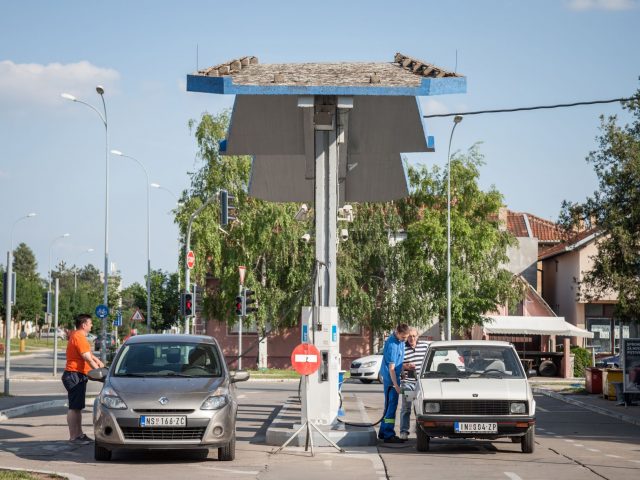 The Republic of Serbia, a country of over seven million people, is located at the crossroads of central and southern Europe and is a transit point for many important commodities traveling from Europe to a wide variety of destinations. In 2009, Serbia’s economy was struggling and a decrease in fuel excise taxes was exacerbating the problem. Serbia’s government noticed that, while the number of fuel stations and the number of vehicle registrations were both increasing, the taxable sale of fuels used in cars was, at the same time, declining. This alerted officials that fuel fraud, intended to facilitate evasion of excise taxes, was an issue that needed to be addressed.
The Republic of Serbia, a country of over seven million people, is located at the crossroads of central and southern Europe and is a transit point for many important commodities traveling from Europe to a wide variety of destinations. In 2009, Serbia’s economy was struggling and a decrease in fuel excise taxes was exacerbating the problem. Serbia’s government noticed that, while the number of fuel stations and the number of vehicle registrations were both increasing, the taxable sale of fuels used in cars was, at the same time, declining. This alerted officials that fuel fraud, intended to facilitate evasion of excise taxes, was an issue that needed to be addressed.
By 2013, 1,434,000 tons of diesel had been consumed in Serbia, while only 902,000 tons had been sold by oil companies through wholesale channels. This left a staggering 37 percent of volume unaccounted for— equating to a tax value of about USD 246,749,850.
The government of Serbia determined that this disparity could be explained by the practice of two illicit trade patterns:
- Direct revenue losses: In this case, fuel to be transported is purposely under-measured by manipulation of measurement equipment and falsification of transport documentation. The unaccounted-for fuel is then diverted to the black market.
- Indirect revenue losses caused by fuel being adulterated and sold at lower costs. This practice was harmful beyond the excise tax losses, as the introduction of adulterants degraded fuel quality—resulting in lower fuel efficiency, harm to the environment, and damage to vehicles and equipment
Solution
PILOT PROGRAM
Prior to the Serbian government implementation of a national fuel authentication solution, a pilot program was initiated to test the suitability of the fuel marker provided by Authentix. The pilot program proved that the marker did not have any adverse effect on fuel properties, homogenized well with the fuel, and the detection technology was easy to use. Most importantly, it demonstrated that the marker made it possible to detect unmarked (i.e., illegal) fuel, and the marked fuel was effectively quantified in the field.
PROGRAM ROLLOUT
As the actual program rolled out, regular sampling and testing begun. This included both field testing at petrol stations, internal stations, depots, and refineries, to indicate the presence of illicit fuel; and laboratory testing to confirm the field results.
MARKERS & DEVICES
The Authentix marker chosen for the program is constructed of the same molecular components as the fuel—making it virtually impossible to separate from the fuel once it has been marked and enabling a level of testing that supports successful criminal prosecution. The marking of both petrol and diesel is done manually at the bulk tank level at eight locations, at the auto truck level at four locations, and at the rail truck level at four locations.
The marking of LPG is done manually at 15 locations. Rapid fuel testing at retail outlets and other bulk storage locations uses Authentix’s LSX and LPX technology, which allows inspectors to quickly screen all retail fuel stations and immediately determine whether the retail fuel has been diluted.
Government officials may then choose to act based on the results from Authentix LSX 2000 and LPX1000 devices (specifically in cases of repeated failed tests over a period), and/or send samples for laboratory testing with our MSX1000 and HPLC devices.
Outcome
In just the first five months of the fuel authentication program, nearly 1 billion liters of fuel were marked, and the Serbian government began to see significant evidence that the program was working— even before enforcement started. Sales volume increased 18% for diesel, 14% for gasoline. And excise revenues increased by over USD $39M when compared to the same period the year before.
- Fuel excise tax collections in February-March 2014 increased by more than USD $23M over the same period in 2013
- It was reported on national television that government fuel excise revenues for 2014 were almost USD $161M higher than the year before
- The number of failed samples at retail outlets has decreased steadily and is now 75% lower than at the start of the fuel marking program.
- Volumes of marked fuel have increased by about seven percent, resulting in significantly increased inflows from paid excises to Serbian government coffer
- From 2013 to 2018, the inflow of funds from the collection of excise taxes on petrol and diesel into the Serbian budget increased by about USD $232M
- From 2013 to 2016, consumption of diesel fuels increased by 30%
Fuel Authentication Case Study: West Africa
|Authentix solution uses authentication technology and transfer of knowledge to build a reliable, best-in-class program for a developing country.
THE CHALLENGE
A West African country was experiencing a significant deterioration in the quality of its petroleum products due to adulteration. Consumer confidence in the fuel supply was rapidly diminishing as adulterated fuel damaged vehicle engines resulting in a flood of consumer complaints. In most cases, the adulterant used to dilute the fuel can result in the release of harmful emissions to the detriment of the environment and public health. Before the implementation of a fuel authentication program, the recorded level of fuel adulteration was 32%. Illicit trade also impacted the appropriate recovery of fiscal tax revenues and government subsidies from the sale of petroleum and diesel for passenger vehicles. A country’s excise tax on petroleum products is diminished when fuels are diluted with products subject to a lower tax rate. National subsidies are negatively impacted when subsidized fuels are smuggled to countries where prices are higher.
In 2012, in response to this crisis, a government agency was created to ensure the efficiency and profitability of the local petroleum industry, ultimately working to safeguard the quality of petroleum products placed on the local market. The agency’s goal was to halt the adulteration of petroleum products and ensure that subsidized products were reaching the intended consumers. An official fuel authentication scheme was enacted by the government agency to achieve these goals. The scheme was introduced in 2013 and awarded to Authentix as prime contractor, a leading global authentication program and information services company.
THE SOLUTION
Authentix works with governments to ensure authentic products are sold in-country to benefit law abiding citizens – not criminals. Fuel marking solutions enable governments to collect more excise taxes without raising taxes for the benefit of citizens and legitimate industries. By delivering technology and partnership strategies, the Authentix fuel authentication program is financed and operated by Authentix with a program of knowledge and skill transfer so governments can independently operate their own fuel authentication initiatives. The Authentix end-to-end solution uses chemical markers built to withstand adulteration and illicit filtering methods, the AXIS Information System, an integrated set of software applications, and in-house services and support (advisory, design, implementation and operational) to customize security solutions for its customers. Authentix, as prime contractor, designed, financed, built, and managed the operations together with the customer of the entire program before transferring it to a local partner after several years.
As this program was the first in the country, Authentix designed the program based on the national mid and downstream fuel distribution networks and implemented the infrastructure and operations to maximize the efficiency and minimize interference with the local operators. Initially, fuel marking was rolled out to ten fuel depots. The program was expanded to all 13 national depots with additional sites coming online as they become operational. Authentix trained the government customer for field testing which was initially conducted to set the baseline for fuel adulteration occurring and subsequent subsidy and revenue recovery calculations.
Markers and Devices – A machine-readable marker was added to the fuel supply at test retail stations (and later to the national supply at fuel depots) where unannounced checks could be conducted. A layered testing approach used the LSX 2000 field portable analyzer to screen samples. Failures were retested and, if failed a second time, were sent to a local lab for forensic testing. This layered solution provides scalability at a low total cost with enforceable results for legal prosecution.
AXIS Information System – Expansion of the program required more efficient ways to operate the program daily. Authentix deployed the Marking Operations Management System (MOMS) module of the AXIS Information System when it was determined that manual completion of truck marking orders and certificates wouldn’t meet the needs of fuel depot personnel. The digital database eliminates the need to manually input data from forms, a tedious process subject to error. Legible printed orders and certificates resulted in a higher professional standard of documentation. Data from the depots is compiled and sent to the government agency for analysis and official record keeping.
Services and Support – Under the guidance of the government agency, the fuel authentication program has followed a process of continual improvement and stakeholder engagement, including changing elements of the program, adapting to the actual conditions of the fuel supply chain and the agency’s desire for a greater role in daily operations. Authentix supported this process
by providing training and guidance to transition to government agency-led management and implementing significant improvements to the analyzers, chemometric testing methods and depot operations.
THE OUTCOME
The Authentix fuel authentication program successfully identified product adulteration, earning back consumer confidence, recouping lost tax revenue and creating a significant number of highly skilled jobs for local people. The increase in tax revenue assisted government investment in critical infrastructure projects including roads, health posts, and schools. Over time, the Authentix build-operate-transfer fuel authentication model moved the operational workload of the program to the government agency. This approach supported the agency’s goal of independently operating its own fuel authentication program. Authentix as prime contractor delivered the following measurable successes from 2013 to 2017 have included:
- A steady decrease in adulterated samples from 15-19% in 2013 leveling off to 3-5% in 2017.
- A year-over-year reduction (196 million liters in 2013 to 95 million liters in 2017) of legitimate non-taxed product in the supply chain.
- An increase in consumer confidence as evidenced by a reduction in consumer complaints in an annual customer satisfaction survey.
- Generation of more than USD 200 M in additional excise revenue retention and subsidy recovery.
- A 50% increase in the number of retail outlets tested and year-on-year increases in testing frequency. This in combination with actively sanctioning those found with adulterated fuels, has resulted in a strong deterrent effect.
- Increase in the programs reach by deploying higher numbers of analyzers in the field and labs. This has driven the creation of local maintenance and auditor jobs.
Beautiful and Secure Packaging
|Protect Your Customer. Protect Your Brand.
For the brand manager, packaging designer or packaging engineer, there are many factors to consider when designing new artwork, graphics and security for product packaging. Incorporating higher security features into product packaging for brand protection is becoming more of a priority for many companies because of the ongoing threat of counterfeiting.
However, it is challenging to mix effective brand protection, great branding and regulatory needs into one design.
This article offers insights on how to navigate these challenges while maintaining the packaging appearance.
Download the Article
Case Study: Major US Fuel Marketer Protects its Brand Promise and Revenue Stream
|Fuel authentication solution by Authentix used to combat commingling achieves a seven percent decrease in failure rate for a major US fuel marketer.
THE CHALLENGE
In the early 2000s, our customer, a major Fortune 20 fuel marketer, acquired the retail operations of another large fuel marketer. This purchase increased our customer’s retail operations footprint substantially. The acquisition added new complexities to the fuel marketer’s supply chain, including:
-
- Adding over 10,000 stations to the retail network
- Consolidating two branded additives to one third-party additive package
- Using more than 100 unmonitored, third-party fuel terminals
- Continued divestiture of company-owned stations to franchise ownership
THE NEED
Consequently, the company became concerned about the integrity of their combined gasoline supply chain, the possibility of commingling, and of fuel terminals running out of gasoline.
The fuel marketer required that any fuel marker selected to combat commingling meet all U.S. E.P.A. standards, as well as more rigorous California E.P.A. Air Resource Board (CARB) standards. This required a marker chemistry that would not harm the environment or cause adverse health effects through combustion and evaporative emissions.
Able to meet all requirements, Authentix has been the fuel authentication solutions partner since 2002 for this company, which today involves nearly 15,000 branded sites in the United States.
THE SOLUTION
The Authentix fuel authentication solution developed for this large fuel marketer is an advanced solution that includes a fuel marking system consisting of physical markers added to fuel; information systems including proprietary software, data collection, and reporting; and services including:
- Lab testing and sample analysis
- Program management and sampling oversight
- Results analysis and reporting
- Sample collection in the field
The Authentix solution uses a mass differentiated molecular marker with gas chromatography-mass spectrometry (GC-MS) analyzers, considered to be the gold standard for forensic analysis. At the additive facility, the marker is added to the customer’s additive package. It is then shipped to over 100 terminal facilities across the country, where it is injected into the base fuel according to prescribed treat rates.
Samples from approximately 400 retail stations are delivered to the Authentix Analytical Laboratory for analysis. Using three Agilent GC-MS analyzers, a sample analysis is conducted for the customer’s fuel and additive.
THE OUTCOME
Since developing and implementing the fuel authentication program in 2002, Authentix has marked more than 200 billion gallons of gasoline to all 50 states with outstanding results:
- Decrease of seven percent in failure rate directly attributed to a reduction in the commingling of non-branded gasoline with branded product
- Greater integrity within the complex fuel supply chain
- Increase in consumer brand confidence and competitive advantage across the U.S.
Authentix® UK Named in This Year’s York Top 100 Business List
|ADDISON, Texas, November 14, 2019 — Authentix, the authority in authentication and information services is proud to be part of this year’s York Top 100 Business list. Moving up from 85 in 2018 to 50th position is a testament to the hard work and dedication of the York, UK based team and all those who support them in delivering advanced authentication solutions.
As a joint effort ofYork Business School at York St. John University, Make It York and The Press, the York Top 100 Business List has been in publication for three years. This year’s process involved a thorough framework that included defined search parameters and a public financial reporting database software platform for data collection containing information on more than 11 million companies in the UK and Ireland.
The search and review process included companies within the City of York Council boundary and some postal codes adjacent to the city boundary. York Business School looked at elements such as turnover, balance sheet and/or shareholder funds, profit levels, growth rate over the past two years, and headcount.
“We are honored to be a thriving part of the York business community. Being recognized in the York Top 100 Business List is a testament to the commitment of the entire Authentix York team, and all of our employees who are focused on our clients and the communities we serve,” said Kent Mansfield, chief sales and marketing officer. “With our new position this year and being part of the top 50 Firms, our team is motivated to continue our company’s strategic focus to expand our reach as a global organization helping to create a world of confident commerce.”
About Authentix:
As the authority in authentication solutions, Authentix helps customers thrive in supply and distribution chain complexity. Authentix provides advanced authentication solutions for governments, central banks and commercial companies, ensuring local economies grow, banknote security remains intact and commercial products have robust market opportunities. The Authentix partnership approach and proven sector expertise inspires proactive innovation, helping customers mitigate risks to promote revenue growth and gain competitive advantage.
Authentix, Inc. has offices in North America, Europe, Middle East, and Africa serving clients worldwide. For more information, visit https://www.authentix.com. Authentix® is a registered trademark of Authentix, Inc.
##

